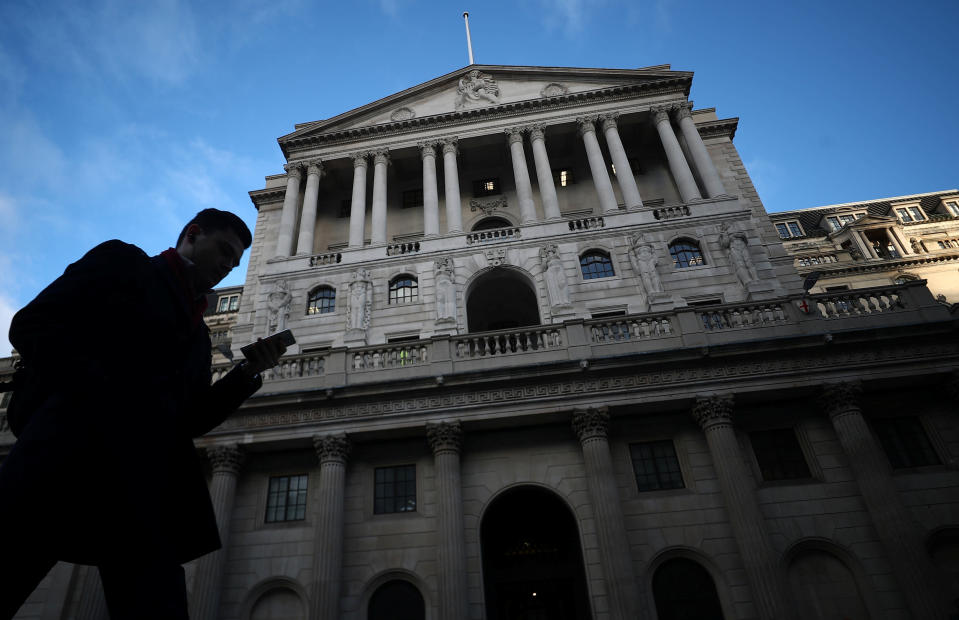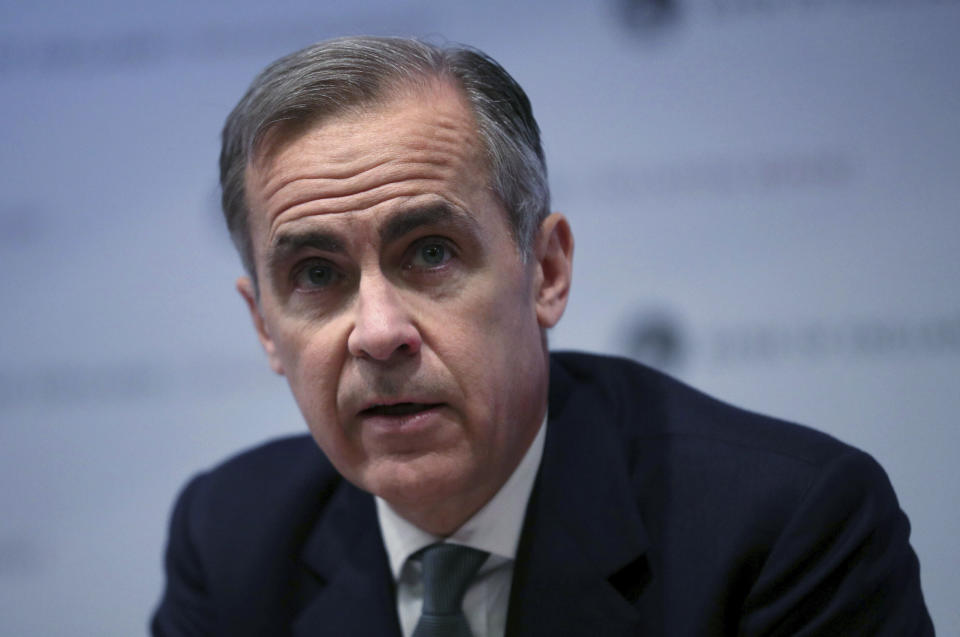Bank of England set to leave interest rates unchanged — but hint at a summer rise

Economists expect the Bank of England to leave the UK interest rate unchanged this week but flag a rate rise later this year.
This week is ‘Super Thursday’ for the Bank of England — the central bank will publish the latest decision of its interest rate-setting Monetary Policy Committee (MPC), the minutes from the MPC’s latest meeting, and the latest inflation report.
Bank governor Mark Carney will also give a press conference after the documents are published at 12pm UK time.
Economists expect the MPC to leave the headline interest rate unchanged at 0.75%.
However, a combination of better-than-expected economic growth, rising inflation risks, and reduced no-deal Brexit risks means forecasters expect the Bank of England to hint that rates could rise later this year.
Better-than-expected growth
“The very strong labour market continues to generate high numbers of jobs and increasingly positive real earnings, and though the MPC will remain patient for now, it may warn that a rate hike is likely to come much sooner than currently priced in unless the labour market starts to lose momentum,” UBS’ John Wraith wrote in a note to clients.
Higher earnings typically lead to inflation as people flush with cash spend the money and push up prices. Raising interest rates is a way to control inflation, by encouraging people to put money into savings accounts rather than spending it.
As well as a strong labour market, global growth is performing better than expected and this could also increase inflationary pressure. February UK GDP came in at 0.2%, compared to forecasts of no growth, while first quarter GDP growth in the US smashed forecasts at 3.2%.
“The MPC cut GDP forecasts for the Eurozone, US, and China in Q1 in the last iteration of its forecasts in February (and cut the US estimate again March),” Wraith wrote. “All now look too low, and are likely to be pushed higher. In addition, financial conditions are noticeably looser, and that will further boost economic prospects.”
The risks of a no-deal Brexit are also receding after the exit date was delayed until the end of October.
READ MORE: Deputy governor warns fintech risks pushing finance beyond regulation
“The downside risks to the economic outlook posed by Brexit arguably have eased since February,” Samuel Tombs, the chief UK economist at Pantheon Macroeconomics, wrote in a note to clients.
“Both the U.K. government and E.U. member states have demonstrated that they prefer delaying the U.K.’s departure from the E.U. to enduring the political and economic consequences of no-deal. MPs have shown that an effective majority exists to thwart any future attempts at a no-deal departure.”
Brexit risks have largely kept a lid on rate rises up until now and the receding risks could make it easier for the MPC to act.

Hints at a summer rise
Economists think these factors are not strong enough to force a rates rise this week, but mean Bank of England governor Mark Carney could hint rates will rise later in the year as pressures build.
“While we anticipate a unanimous vote this week, we think there is some scope for Thursday's Inflation Report and governor Carney's press conference to be marginally hawkish,” Deutsche Bank economists Sanjay Raja and Oliver Harvey wrote in a note to clients this week.
In central banking, a “hawk” is someone who favours high interest rates, while a “dove” is someone who favours lower interest rates.
Economists and investors watch central banks minutes and press conferences closely for any “hawkish” and “dovish” wording to ensure their portfolios are positioned correctly ahead of any rises. Central bankers also like to flag changes before they happen to prevent any market shocks.
“The MPC needs to ensure it can hike Bank Rate without undue disruption in the second half of this year, if the recent favourable run of economic data continues,” wrote Tombs.
Deutsche Bank is forecasting an August rates rise, while Pantheon Macroeconomics said there is a 50% chance of a rates rise in August. Nomura expects the Bank to hike rates in November.
Financial markets are currently predicting only a 30% chance of interest rates rising this year.
Any interest rate hike is likely to be by 0.25%, taking the headline rate of interest in the UK to 1%.
————
Oscar Williams-Grut covers banking, fintech, and finance for Yahoo Finance UK. Follow him on Twitter at @OscarWGrut.
Read more:
Mark Carney vows to reinvent Bank of England for 'fourth industrial revolution'
Sales jump at Snoop Dogg-backed ‘try before you buy’ payment firm
Challenger bank Tandem to double headcount as CEO warns of Brexit brain drain
Station F is a €250m statement of France's tech ambitions — and Britain should be worried

 Yahoo Finance
Yahoo Finance 